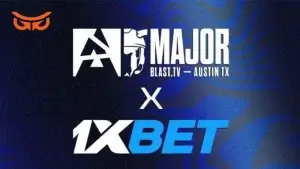Esports, which may be defined as competitive gaming, is only one aspect of an incredibly extensive industry. Bearing this in mind, when betting on esports, it’s essential to understand all of the pieces which make up the end-product involving epic prize pools and packed stadiums. Indeed, read on as we concisely discuss how this billion-dollar industry facilitates a dynamic and booming esports ecosystem!
[cta id=2581 type=geo]Overall, we’ll be taking an approach which gradually discusses each component of the industry, ranging from game development to esports organizations.
The Esports Ecosystem: Multiple Moving Parts
Everything Starts and Ends with Game Development
Considering that esports is competitive gaming, the first course of action is for a game developer to develop a title which is engineered for esports. Using talented teams of developers, designing the software and digital products associated with a game, the finished product is then brought to a publisher. In such a situation, the publisher distributes the game to the community for fans to enjoy and potential professionals to begin investing their time and hosting teams. Notably, certain companies carry out both the game development and publishing themselves.
Here are some examples of publishers and game developers together with examples of their associated esports titles:
- Blizzard Entertainment – Call of Duty, Overwatch
- Riot Games – VALORANT, League of Legends
- Tencent – PUBG Mobile
- Psyonix – Rocket League
- Garena – Free Fire
- Epic Games – Fortnite
- Valve – CS:GO, Dota 2
- Ubisoft – Rainbow Six Siege
The entire esports ecosystem starts with a game. To be specific, the game needs to be both popular and successful and ideally, a competitive or ranked game mode for the community to develop an interest in a competitive scene.
Before diving into other components of the esports ecosystem, it is important that the work for game developers does not end with the launch of a title. In fact, an incredibly important factor for the longevity of an esports title is changes to the game, in multiple ways depending on the title:
- Weapon changes
- Ability changes
- Adjusting map design and in-game components
- New maps, agents and weapons
All of the above is in response to community and competitor feedback. The dynamic between a game developer and the community can make or break an esports title. Some games, such as CS:GO, have been receiving constant changes since 2012.
Tournament Opportunities in the Esports Ecosystem
Once a title is released, and the dynamic between game developers, the next step is to provide opportunities for competition. Many consider tournaments to be the core of the esports industry, especially esports betting.
In this regard, there are two important concepts to grasp. Firstly, events may be organized either online or offline, where offline events bring the competition to a stadium or arena and are considered to be way more competitive. This decision will often be reflected in who the tournament organizer is and their relationship to the esport.
To begin with, first-party organizers are those companies who act as both game developers AND tournament organizers for the highest level of the esport. Here are some examples:
- Psyonix – Rocket League
- Riot Games – VALORANT, League of Legends
- VALVE – CS:GO, Dota 2
- Blizzard Entertainment – Call of Duty, Overwatch
- Ubisoft – Rainbow Six Siege
Besides first-party organizers, we also have third-party organizers. These are companies specifically designed to host events for esports titles, covering a range of various disciplines as exemplified by the following:
- BLAST – Fortnite, CS:GO
- PGL – Dota, CS:GO
- ESL – CS:GO, Dota, SCII
- KRAFTON – PUBG Mobile
Depending on the esport, both first-party and third-party organizers work together to design a competitive calendar with a variety of events to enjoy. Typically, the last event of the season is designed to be an incredible showing, one which crowns a World Champion team or player, together with huge prize pools.

Epsorts tournaments hosts have to attract both players and sponsors. Prize money goes a long way for both, as high stakes draw better players and more spectators. Dota 2’s yearly finale, The International, boasts prize pools in excess of $40 million dollars. These post-season events are awesome opportunities for esports betting.
Esports Tournaments: Designed for Esports Teams
With such immense prize pools and tournament structures, individual competitors often need to work together to succeed. This opportunity offers a parallel to traditional sports, where esports organizations or esports teams have formed. Apart from forming teams, providing jerseys, developing coaching staff and providing an identity, esports teams handle many more responsibilities.
These include supporting social media pages, merch stores and developing a loyal fanbase to support them at events. Here are some examples of popular esports organizations:
- FaZe Clan
- OpTic Gaming
- Royal Never Give Up
- NRG
- Natus Vincere
- Astralis
- T1
- Ninjas in Pyjamas
And the list goes on and on. Commonly, these esports organizations support a number of teams or individuals across a number of different esports titles in the esports industry ecosystem. Thanks to esports teams investing in esports, the community enjoys storylines and familiar faces wherever they go.
Viewership, News and Sponsorship
Viewership and News in Esports: More Eyes, More Sponsors
Livestreaming on Twitch, Facebook and Youtube is one of the biggest sectors for any esports ecosystem report. While yes, in-person crowds are great, a high-quality broadcast can attract millions of viewers from all over the world. Considering this, it’s simple to appreciate that where attention gathers, sponsorship and advertising opportunities are soon to follow.
As you can imagine, tournament organizers play a role in designing a broadcast, which ranges from simple gameplay to eye-grabbing commentary, analysis breaks and multiple languages. Launching an event into the public eye includes many options, here are some live-streaming platforms examples to consider:
- Twitch
- YouTube
- afreecaTV
- Facebook Gaming
- TikTok
- National TV – in some countries
Viewership is what makes esports unique – regardless of where you are in the world, you can tune in to the best esports events in the world for free, unlike traditional sports. These streams are also quite protected, as Twitch began cracking down on DMCA copyright violations a few years ago.
A component of viewership is streaming, where personalities host watch parties for esports events. Many of the most famous streamers, like Shroud and XQC, got their start playing for professional esports teams. The most recognizable streamer in the world, Ninja, is doing the same process in reverse, often publicizing his casual esports efforts. Many esports organizations sponsor a “stream team,” and almost all esports tournaments have a connection to a streaming platform.

When it comes to news, a number of websites offer extensive coverage of industry changes, press releases, tournament previews and recaps to help keep the community informed. These websites also include written and video news, exemplified through social media pages and esports betting sites like Esports Bets. Some of the biggest companies in esports coverage are theScore and GINX.
Advertising in Esports: Truly Unique Opportunities
Esports provides a unique access point to one of the most difficult-to-breach markets, thanks to its open nature and accessibility. Computer manufacturers, internet providers and innovative services all want a direct line to gamers in their 20’s with excess income. Gamers are more likely to embrace new tech, further compounding the value of proper advertising. However, appealing to the esports crowd is no easy task.
To avoid mentioning lists of sponsors, they often fall into the categories of automotive manufacturers, food and beverages, financial services and others!
Twitch commercials, tournament sponsorships and team partnerships are the most common forms of esports advertising, though creativity can go a long way to connecting with the audience. Betway’s custom Counter-Strike training maps both provided a fun and valuable service, earning them awards from the industry and attention from fans.
Regardless of the precise means, supports from sponsors is an essential part of the esports ecosystem, especially in tournament structures such as franchised esports. Sponsors may support tournament organizers, game-developers or esports organizations.
Betting: The Final Piece of the Esports Ecosystem
Everything considered – constant game changes, a plethora of esports teams, accessible viewership and sponsorship support all make for a unique betting experience.
It didn’t take long for the betting industry to take esports under its wing with so much competitive action. The way esports work is valuable for betting sites; as new games are introduced, older, less popular games die off, leaving fans hungry for a new game. Some titles stick around forever, so there’s lots of potential for each new esports title. Esports betting sites tend to either be dedicated video game-only sites or hybrid sites that offer traditional and virtual sports betting.









